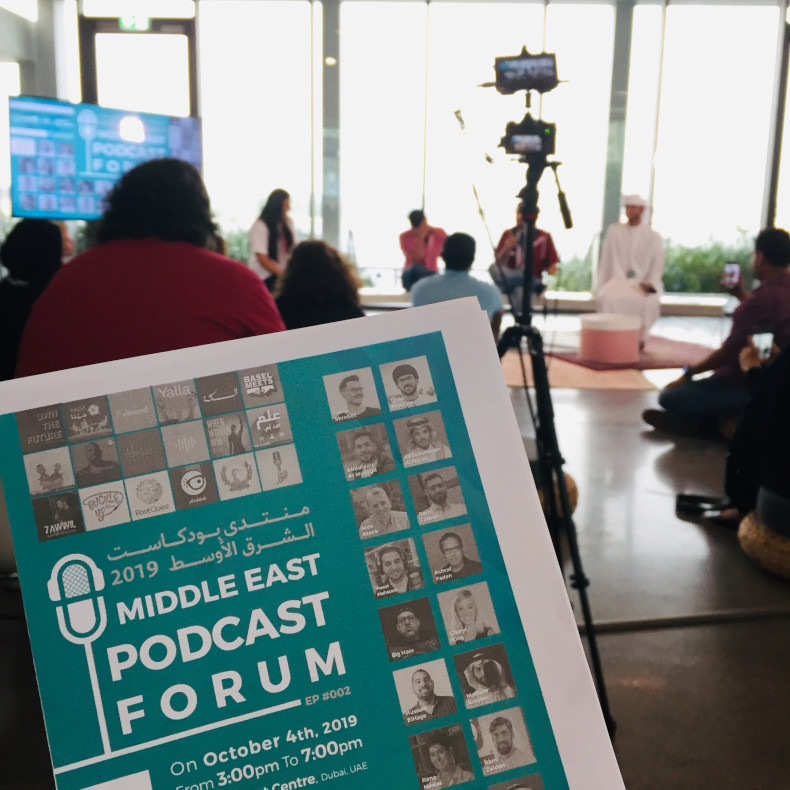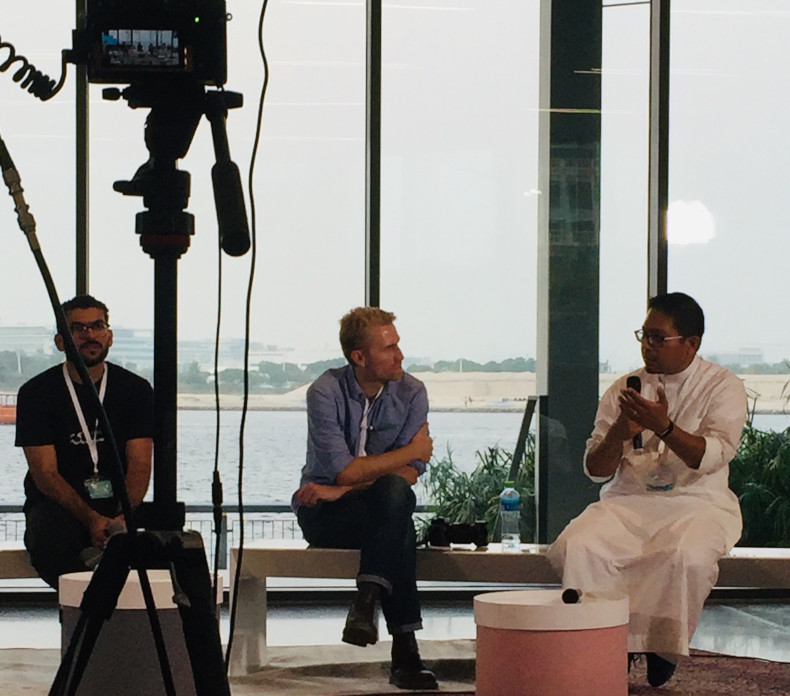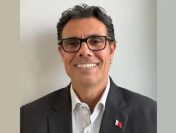 If last year’s debut edition of the Middle East Podcast Forum was a step towards activating the local podcast community, the forum this year aimed at strengthening the ecosystem for podcast creators and listeners alike. In its mission to offer a space for creative minds, Jameel Arts Centre, Dubai, hosted the second Middle East Podcast Forum on October 4, 2019. Once again, Jeddah’s podcast network MSTDFR, and the Middle East’s first venture-backed podcast company Kerning Cultures joined hands to put together the forum.
If last year’s debut edition of the Middle East Podcast Forum was a step towards activating the local podcast community, the forum this year aimed at strengthening the ecosystem for podcast creators and listeners alike. In its mission to offer a space for creative minds, Jameel Arts Centre, Dubai, hosted the second Middle East Podcast Forum on October 4, 2019. Once again, Jeddah’s podcast network MSTDFR, and the Middle East’s first venture-backed podcast company Kerning Cultures joined hands to put together the forum.
State Of ME’s Podcast Industry
With Anghami and the entry of more streaming platforms such as Deezer and Spotify in the Middle East, the technology to stream and distribute podcast shows exists and continues to evolve, but the forum speakers established that there still exists a content vacuum, especially when it comes to narrative-style content in Arabic. This vacuum as well as the small-scale infrastructure required to start a show creates a very low barrier of entry into the podcast industry.
And for aspiring and amateur podcasters, the knowledge-sharing platform of the forum proves invaluable. With speakers from Middle East-based streaming platforms, podcast shows and marketing agencies, the audience of current and aspiring podcasters had several tips to help them hit the record button with more confidently.
Mastering The Art Of Podcast Interview
With many creators choosing to develop interview podcasts over narrative or story-driven shows, the success relies on the art of conducting the interview. How to create a safe space to extract deep information from the interviewee? How to ask better questions? How much pre-interview research is enough? ‘The Art of the Interview’, a panel discussion moderated by Lucas Skorobot (Own the Future) at the forum aimed at unearthing different techniques used by seasoned local podcasters Alex Atack (Kerning Cultures), Turki Ali Albalushi (Al-Sekka) and Ashraf Faden (EishBTSWI).
Guests Who Tell Stories
Mr Albalushi, an Omani journalist and founder of the Arabic language podcast Al-Sekka puts in substantial time researching his guests. Sometimes he spends almost a week on research for a 40-minute recording session. Also, he isn’t interested in indulging his interviewees on previously explored topics, and that’s where his research helps.
He said, “I meet my guests sometimes thrice before the interview to identify untold aspects of their experiences; I get to understand them and establish that comfort level so they can speak openly.”
In order to get his guests to tell their stories, Mr Faden shares his background and personal experiences. The strategy works well for this cohost of Eish BTSWI, a podcast interview where guests divulge the journey they navigated in their careers.
We all know of guests who give those dreaded one-word answers. How do the folks at Kerning Cultures maneuver such situations, especially given the complex narrative style that the show adopts? “We try and get guests who we know would make for good tape,” explains Mr Atack who gauges his guests’ storytelling ability through phone conversations with them during the initial research phase itself.

Set The Mood, Then Press Record
On creating an environment conducive for guests, Mr Faden says, “From studios to offices and living rooms to hotels, I have recorded my podcast wherever the guest prefers so that they feel they are in a space where they can open up and answer hard questions. Also, if it’s a face-to-face interview, I demonstrate that I am engaged in the conversation not just through my words but also my body language.”
He added, “It’s very important to follow up your guest’s response with a question, or simply summarize his response”.
Mr Albalushi explains he lifts the pressure on guests by emphasizing that recording a podcast is not the same as speaking live on a radio show, which can be a nerve-wracking experience for some. He elaborates, “Post the interview, I share the recording with my guests, giving them the option to tell me what they want or don’t want featured in the final episode.”
The aspect of seating plan for an interview shouldn’t be undermined. Kerning Cultures’ Mr Atack shares that for their recording sessions, they prefer the informal sofa or couch style seating versus having guests sit across the table. “We don’t want to make them feel like we’re interviewing them for a job. Let’s not forget that we are used to recording – we do it all the time. But for our guests, it’s probably their first time.”
To Ask Or Not To Ask… Also, How To Ask
Asking the right questions is the first requirement for a successful podcast interview. “We ask hyper-specific situation based questions and get our guests to think in scenes and draw out visual answers. And as a strict journalistic practice, we never share our questions with our guests beforehand,” Mr Atack said.
Mr Albalushi takes the reverse approach. In order to make his guests comfortable at the time of recording, he shares his questions with them beforehand, but maintains he doesn’t share post-recording as per editorial discretion.
The panelists agreed they must be prepared with a list of questions to ask, and the interviewer must stay in the moment. They must genuinely listen, ask follow-up questions one human to another, and be open-minded as sometimes the best taping moments come unplanned. “Nothing is more off-putting than the interviewer reading a list of questions,” Mr Atack cautioned.
When it comes to asking tough questions, he advised “Just ask them!” but maintains that questions which may possibly offend guests probably shouldn’t be on your list to begin with. Mr Faden, who is also a diagnostic medical sonographer by day, says his professional background and work experiences work to his advantage when interviewing guests for his podcast. Mutual respect, he believes, should always be maintained between interviewer and interviewee.
When All Doesn’t Go To Plan
Panelists on other sessions at the forum disclosed that regardless of how prepared one is before the interview recording, usually all never goes according to plan. Sometimes, uninvited guests turn up too, said Fowzi Mahsoon of House Zofi, whose listening skills were tested when he interviewed not just his influencer guest but her overbearing mother who accompanied her to the recording.
Other times, the uninvited interview guest could even be a rat as it was in podcaster Saeed Alshamsi’s case. Ultimately his advice to aspiring podcasters is “Be ready for everything!”




